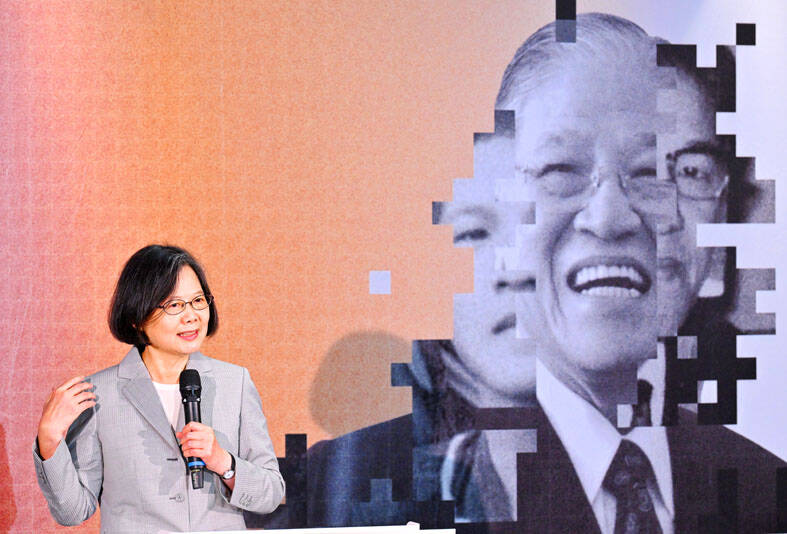Taiwan’s democratic achievements would not have been possible without the solidarity that had formed from the crucible of adversity, former president Tsai Ing-wen (蔡英文) said yesterday at the launch of an exhibition celebrating former president Lee Teng-hui’s (李登輝) legacy.
Her comments came days after the Democratic Progressive Party (DPP) suffered a rout at the ballot box in Sunday’s recall votes targeting 24 Chinese Nationalist Party (KMT) lawmakers.
Each generation of Taiwanese must face their unique challenge, she said, adding that the 1990 Wild Lily Student Movement under Lee’s administration sparked the tsunami that ended the Period of National Mobilization in Suppression of Communist Rebellion and ushered in democracy.

Photo: Liu Hsin-de, Taipei Times
“The generational challenge before us is that of expanding civic participation to allow the voice of the people to be heard,” Tsai said.
Successfully overcoming this challenge is crucial for strengthening the nation’s democratic institutions and safeguarding the hard-won fruits of freedom, she said.
Taiwan’s struggle for democracy has never been smooth sailing and overcoming adversity was the crucible of national solidarity that enabled Taiwan to achieve democratic progress, she added.
“We must have faith when confronted by the inevitable setbacks and frustrations on the road to democracy,” Tsai said, adding that every person who participated in a democracy movement contributed to progress.
Tsai thanked the recall campaign volunteers and Taiwanese nationals living abroad who returned to the nation to vote, saying: “We have learned a most valuable civic lesson together.”
The election proved that democracy is not an empty slogan, but a process rooted in the daily lives and choices of Taiwanese, she said.
Democracy is a generational project and this generation of Taiwanese would gather the courage to face the trials the nation must undergo in the next phase of its history, she added.
The free “PROTOTYPE: Mr Democracy 2.0” exhibition — which features artificial intelligence (AI) — is being hosted at the National Taiwan Library for the next two years.
Visitors can engage with the AI-generated Lee by asking him questions in Mandarin, English, Japanese and Hoklo (commonly known as Taiwanese), languages that the real Lee understood.
Lee pushed for constitutional reforms that mandated the re-election of National Assembly members in 1991 and the first full re-election of lawmakers since 1948 the following year.
Lee in 1996 oversaw Taiwan’s first direct presidential election, which sparked the Third Taiwan Strait Crisis, when China conducted a series of missile tests close to the nation.
Lee’s contributions to democratizing Taiwan and his election that year earned him the nickname “Mr Democracy” from Newsweek magazine.
Annie Lee (李安妮), daughter of the former president and chairperson of the Lee Teng-hui Foundation, in her speech at the launch ceremony said: “This is not only a tribute to my father, but a commitment to Taiwan’s future. Democracy is not just a system, it’s a belief.”

The manufacture of the remaining 28 M1A2T Abrams tanks Taiwan purchased from the US has recently been completed, and they are expected to be delivered within the next one to two months, a source said yesterday. The Ministry of National Defense is arranging cargo ships to transport the tanks to Taiwan as soon as possible, said the source, who is familiar with the matter. The estimated arrival time ranges from late this month to early next month, the source said. The 28 Abrams tanks make up the third and final batch of a total of 108 tanks, valued at about NT$40.5 billion

Two Taiwanese prosecutors were questioned by Chinese security personnel at their hotel during a trip to China’s Henan Province this month, the Mainland Affairs Council (MAC) said yesterday. The officers had personal information on the prosecutors, including “when they were assigned to their posts, their work locations and job titles,” MAC Deputy Minister and spokesman Liang Wen-chieh (梁文傑) said. On top of asking about their agencies and positions, the officers also questioned the prosecutors about the Cross-Strait Joint Crime-Fighting and Judicial Mutual Assistance Agreement, a pact that serves as the framework for Taiwan-China cooperation on combating crime and providing judicial assistance, Liang

A group from the Taiwanese Designers in Australia association yesterday represented Taiwan at the Midsumma Pride March in Melbourne. The march, held in the St. Kilda suburb, is the city’s largest LGBTQIA+ parade and the flagship event of the annual Midsumma Festival. It attracted more than 45,000 spectators who supported the 400 groups and 10,000 marchers that participated this year, the association said. Taiwanese Designers said they organized a team to march for Taiwan this year, joining politicians, government agencies, professionals and community organizations in showing support for LGBTQIA+ people and diverse communities. As the first country in Asia to legalize same-sex

MOTIVES QUESTIONED The PLA considers Xi’s policies toward Taiwan to be driven by personal considerations rather than military assessment, the Epoch Times reports Chinese President Xi Jinping’s (習近平) latest purge of the Chinese People’s Liberation Army (PLA) leadership might have been prompted by the military’s opposition to plans of invading Taiwan, the Epoch Times said. The Chinese military opposes waging war against Taiwan by a large consensus, putting it at odds with Xi’s vision, the Falun Gong-affiliated daily said in a report on Thursday, citing anonymous sources with insight into the PLA’s inner workings. The opposition is not the opinion of a few generals, but a widely shared view among the PLA cadre, the Epoch Times cited them as saying. “Chinese forces know full well that